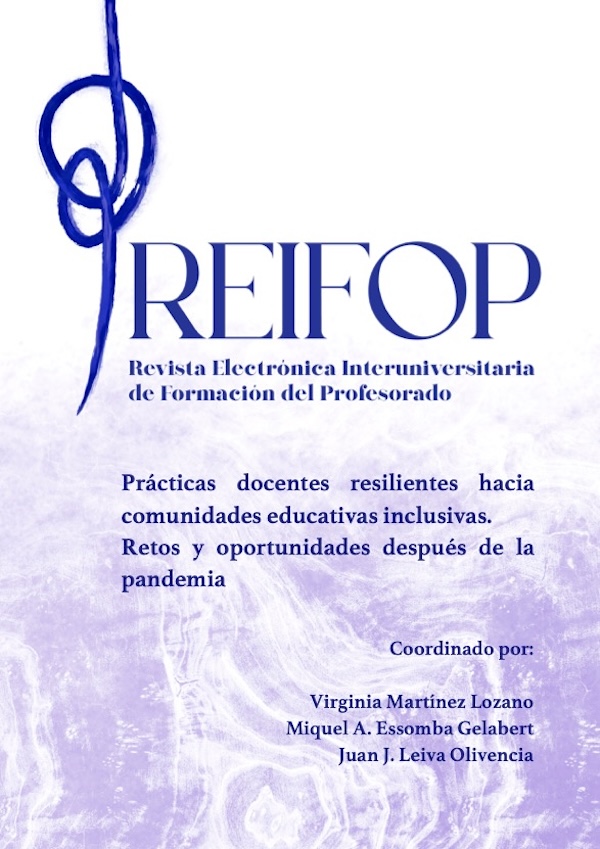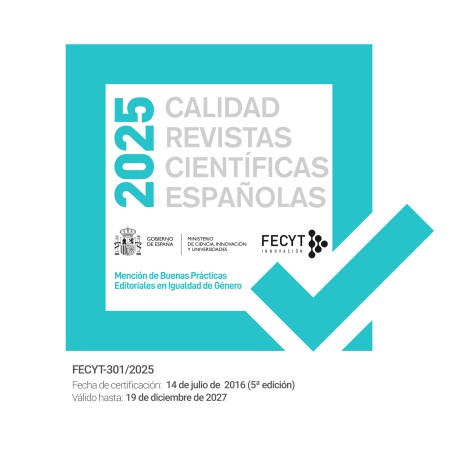Análisis estructural de los predictores psicosociales del estrés en el alumnado universitario en entornos fronterizos multirreligosos
Resumen
La meta principal de los universitarios es la incorporación al mercado laboral. Además de la necesidad de prestar atención a los componentes socioemocionales, el obstáculo para acceder al mercado laboral genera estrés en esta población. Por ello, el objetivo del estudio es analizar el perfil sociodemográfico del alumnado universitario y relacionarlo con las variables psicosociales, motivación y habilidades sociales, predictoras del estrés del estudiantado universitario. La muestra consta de 423 universitarios de la Universidad de Granada. Se utilizaron tres cuestionarios, la Escala de Motivación Académica, Escala de Habilidades Sociales y Cuestionario para medir el estrés percibido. Para el análisis de los datos, se empleó la t de Student para las variables dicotómicas y el ANOVA de un factor para las variables politómicas, para analizar si existían diferencias estadísticamente relevantes; se estableció una correlación para analizar la relación entre los constructos y se elaboró un modelo de ecuaciones estructurales con la finalidad de explicar la predictibilidad de unas variables en relación a otras. Los resultados indican que la motivación influye positivamente en el afrontamiento del estrés y en la reducción del estrés. Así pues, las instituciones universitarias deben desarrollar estrategias de intervención que incluyan objetivos específicos articulados con los intereses estudiantiles.
Descargas
-
Resumen419
-
pdf294
Citas
Alt, D., Naamati-Schneider, L. & Weishut, D. J. N. (2023). Competency-based learning and formative assessment feedback as precursors of college students ‘soft skills acquisition. Journal of Studies in Higher Education, 1-12.
Arias, J., Soto-Carballo, J. G. & Pino-Juste, M. R. (2022). Emotional intelligence and academic motivation in primary school students. Journal of Psychology: Research and Review, 34(14), 1-9.
Bentler, P. M. (1990). Comparative fit indexes in structural models. Psychological Bulletin, 107, 238–246.
Brachtl, S., Ipser, C., Keser Aschenberger, F., Oppl, S., Oppl, S., Pakoy, E. K., & Radinger, G. (2023). Physical home-learning environments of traditional and non-traditional students during the COVID pandemic: Exploring the impact of learning space on students’ motivation, stress and well-being. Smart Learning Environments, 10(1), 7.
Cajas-Bravo, V., Paredes-Perez, M. A., Pasquel-Loarte, L., & Pasquel-Cajas, A. F. (2020). Habilidades sociales en Engagement y desempeño académico en estudiantes universitarios. Comuni@cción, 11(1), 77–88.
De Prada, E., Mareque, M. & Pino-Juste, M. (2022). Teamwork skills in higher education: is a university training contributing to their mastery? Journal of Psychology: Research and Review, 35(5), 1-13.
Dover, Y. & Amichai-Hamburger, Y. (2023). Characteristics of online user-generated text predict the emotional intelligence of individuals. Journal of Scientific Reports, 13, 1-10.
Fridkin, L., Fonts, N. B., Quy, K., & Zwiener-Collins, N. (2023). Understanding effects of COVID-19 on undergraduate academic stress, motivation and coping over time. Higher Education Quarterly, 77(4), 623–637.
Frogner, L., Hellfeldt, K., Ångström, A. K., Andershed, A.-K., Källström, Å., Fanti, K. A., & Andershed, H. (2022). Stability and Change in Early Social Skills Development in Relation to Early School Performance: A Longitudinal Study of A Swedish Cohort. Early Education and Development, 33(1), 17–37.
Fung, W., & Chung, K. K. (2021). The direct and indirect relationships among kindergarten children’s social mastery motivation, receptive vocabulary, and socioemotional skills. Current Psychology, 40(11), 5559–5566.
Gómez-Jiménez, Ó. (2022). Robótica y LOMLOE: Revisión sistemática de la robótica como herramienta inclusiva. HUMAN REVIEW. International Humanities Review / Revista Internacional de Humanidades, 13(1), Article 1.
Hooley, T. J., Bennett, D. & Knight, E. B. (2023). Rationalities that underpin employability provision in higher education across eight countries. Journal of Higher Education, 1-22.
Hoyland, T., Psychogios, A., Epitropaki, O., Damiani, J., Mukhuty, S., & Priestnall, C. (2021). A two-nation investigation of leadership self-perceptions and motivation to lead in early adulthood: The moderating role of gender and socio-economic status. Leadership & Organization Development Journal, 42(2), 289–315.
Johari, J., Razali, N., Hanis Zainun, N. F. & Adnan, Z. (2022). Job Characteristics and Work Engagement: The Moderating Role of Emotional Intelligence. Journal of Performance Improvement Quarterly, 34(4), 687-716.
Kácovský, P., Snětinová, M., Chvál, M., Houfková, J., & Koupilová, Z. (2023). Predictors of students’ intrinsic motivation during practical work in physics. International Journal of Science Education, 45(10), 806–826.
Kuusisto, E., de Groot, I., de Ruyter, D., Schutte, I., Rissanen, I. & Suransky, C. (2023). Life purposes: Comparing higher education students in four institutions in the Netherlands and Finland. Journal of Moral Education, 1-22.
Kyriazos, T.A. (2018). Applied Psychometrics: Sample Size and Sample Power Considerations in Factor Analysis (EFA, CFA) and SEM in General. Psychology, 9(8), 86856.
Lou, H., Chen, J., & Liu, P. (2023). The impact of adolescents’ health motivation on the relationship among mental stress, physical exercise, and stress symptoms during COVID-19: A dual moderation model. Frontiers in Public Health, 11.
Macías-Alonso, I., Kim, H. & González, A. L. (2023). Self-driven women: Gendered mobility, employment, and the lift of he driving ban in Saudi Arabia. Journal of Gender, Place & Culture, 1-20.
Malin, H. (2022). Engaging purpose in college: A person-centered approach to studying purpose in relation to college experiences. Journal of Applied Developmental Science, 27(1) 1-16.
Manzano-Sánchez, D., Postigo-Pérez, L., Gómez-López, M., & Valero-Valenzuela, A. (2020). Study of the Motivation of Spanish Amateur Runners Based on Training Patterns and Gender. International Journal of Environmental Research and Public Health, 17(21), 8185.
Maydeu-Olivares, A. (2017) Maximum Likelihood Estimation of Structural Equation Models for Continuous Data: Standard Errors and Goodness of Fit. Structural Equation Modeling: A Multidisciplinary Journal, 24(3), 383-394.
Murano, D., Lipnevich, A. A., Walton, K. E., Burrus, J., Way, J. D., & Anguiano-Carrasco, C. (2021). Measuring social and emotional skills in elementary students: Development of self-report Likert, situational judgment test, and forced choice items. Personality and Individual Differences, 169, 110012.
Nakajima, N., Jung, H., Pradhan, M., Hasan, A., Kinnell, A., & Brinkman, S. (2020). Gender gaps in cognitive and social-emotional skills in early primary grades: Evidence from rural Indonesia. Developmental Science, 23(5), e12931.
Quiliano Navarro, M., Quiliano Navarro, M., Quiliano Navarro, M., & Quiliano Navarro, M. (2020). INTELIGENCIA EMOCIONAL Y ESTRÉS ACADÉMICO EN ESTUDIANTES DE ENFERMERÍA. Ciencia y Enfermería, 26.
Reza Rahimi, A. (2023). A bi-phenomenon analysis to escalate higher educators’ competence in developing university students’ information literacy (HECDUSIL): the role of language lectures’ conceptual and action-oriented digital competencias and skills. Journal of Education and Information Technologies, 1-28.
Sokolovskaya, I. E., Polyakova, O. B., Romanova, A. V., Belyakova, N. V., & Tereshchuk, K. S. (2020). Educational and professional motivation of students with various religious orientations. European Journal of Science and Theology.
Tenenbaum, G., & Eklund, R. (2007). Handbook of Sport Psychology. Wiley & Sons.
Thomas, C. L. & Heath, J. A. (2022). Using latent profile analysis to investigate emotional intelligence profiles in a sample of American university students. Journal of Psychology in the Schools, 59(9), 1802-1824.
Virtanen, A., & Tynjala, P. (2022). Pedagogical practices predicting perceived learning of social skills among university students. International Journal of Educational Research, 111, 101895.
Waterschoot J., Morbée, S., Vermote, B., Brenning, K., Flamant, N., Vansteenkiste, M. & Soenens, B. (2023). Emotion regulation in times of COVID-19: A person-centered approach based on self-determination theory. Journal of Current Psychology, 42, 20211-20225.
Zhuo, L., Wu, Q., Le, H., Li, H., Zheng, L., Ma, G., & Tao, H. (2021). COVID-19-Related Intolerance of Uncertainty and Mental Health among Back-To-School Students in Wuhan: The Moderation Effect of Social Support. International Journal of Environmental Research and Public Health, 18(3), 981.
Los artículos que se publican en esta revista están sujetos a los siguientes términos:
1. El Departamento de Métodos de Investigación y Diagnóstico en Educación de la Universidad de Murcia (España), junto con el Servicio de Publicaciones de la Universitdad de Murcia (Editum) son los editores de la revista REIFOP y conserva los derechos patrimoniales (copyright) de los artículos publicados, permitiendo la reutilización de las mismos bajo la licencia de uso indicada en el punto 2.
2. Las obras se publican en la edición electrónica de la revista bajo una licencia Creative Commons Reconocimiento-NoComercial-SinObraDerivada 3.0 España (texto legal). Se pueden copiar, usar, difundir, transmitir y exponer públicamente, siempre que: i) se cite la autoría y la fuente original de su publicación (revista, editores y URL de la obra); ii) no se usen para fines comerciales; iii) se mencione la existencia y especificaciones de esta licencia de uso.
3. Condiciones de auto-archivo. Se permite y se anima a los autores a difundir electrónicamente las versiones pre-print (versión antes de ser evaluada) y/o post-print (versión evaluada y aceptada para su publicación) de sus obras antes de su publicación, ya que favorece su circulación y difusión más temprana y con ello un posible aumento en su citación y alcance entre la comunidad académica. Color RoMEO: verde.
















